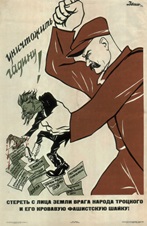
Anti-Trotzky poster, 1937
|
Another case happened to me a year later, in 1940, when I was a lecturer at a military preparatory college for the conscripted personnel, teaching radio communications basics and skills. (I had graduated from a Military Academy with excellence, so I was well-versed in these fields of technology).
I shared my living quarters with another young lieutenant named Nikolai and we used to talk frankly about different subjects.
I was hungry for knowledge. While being a cadet at a Military Academy, a lot of my time was spent in the library reading room, where in addition to technical books I had access to fiction books and the encyclopedia.
The time of 1937-1939 was known as the time of “great purges.” The special police were discovering conspiracies of "enemies of the people" left and right.
It was carrying out purges, starting with civilians and ending with the senior military staff. Many of these "conspirators," before they were arrested for their alleged crimes, were respected military commanders, decorated members of the ruling Bolshevik elite.
Because of that constant change, the school textbooks and all historical literature were being constantly amended. Sometimes, however,
|
the censorship was behind schedule and that happened in my case .
The encyclopedia I was reading was an old edition and not yet amended for censorship purposes. This edition included entries that Leon Trotsky, the second in command after Lenin during the Bolshevik revolution of 1917 and the Russian Civil War of 1918-1921, was one of the leaders of the revolution, had served five senior posts in the Government of the Bolsheviks, including the post of People's Commissar for Foreign Affairs, and was the creator of the Red Army as well as its first commander.
Moreover, it noted that Trotsky was an excellent orator.
At the time that I was reading this edition of the encyclopedia, Trotsky had been officially declared a “monster” and the arch-enemy of the Soviet Union. The only available public information about Trotsky was extremely negative and unbalanced.
The censors did not have time to clean up the biography of Trotsky in this edition of the encyclopedia, and I read everything as it had been written when he was still well-regarded. That was in 1935.
Fast-forward, now in 1940, Nikolai and I were engaged in a conversation about the skills one needs to speak to an audience, and about oratory in general.
Thinking to impress him, I remarked that according to our encyclopedia the “enemy” Trotsky was a brilliant orator. Nikolai showed no reaction and appeared indifferent. Our conversation then switched to another subject and I completely forgot about this episode.
Several months later, young officers like myself were invited to join the Bolshevik Party. This was a fairly regular event. We all knew that no promotion is possible without a Party card.
A good example was our head of the school for noncommissioned personnel. Never a Party member, he was already forty years old and well versed in communications technology, but only with the rank of a lieutenant. We all knew that the officer occupying his position should have the rank of at least a major or a lieutenant colonel.
And here I am, writing a statement, "Please let me join the Party…". Along with the other young officers, I went to the division headquarters and waited for my turn to appear in front of the selection committee.
I was very confident: I have always been an excellent student of military and political training. I also have had practical experience conducting classes on technology and on political training. Finally, it was my turn, I walked in and reported myself ready for their decision.
Suddenly, the chairman of the commission, who was also the deputy head of the political division, said: "Well, Lieutenant, do you still think that the worst enemy of the Soviet state, Trotsky, was a good orator?"
I did not expect this turn of events, and standing still I blushed and fell silent.
The Chairman continued: "I believe that it is early for Lieutenant Katz to join our Bolshevik Party. You may go now."
At that moment, I realized the value of words that are often repeated to us by our division commander, "Keep your mouth shut."
Since then, I have participated in conversations with my army comrades only on the topics related to my immediate job.
|